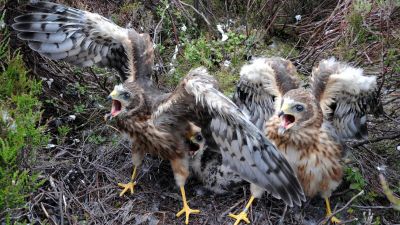Hen harriers have 'record' breeding season as chicks fledge across Cumbria

Endangered hen harriers are making "great progress" in England - after chicks successfully fledged from nests across Cumbria.
The rare bird of prey have had their best breeding season in England for years, with 60 chicks fledging from 19 nests, conservationists have said.
As recently as 2013, there were no successful nests and it was feared the hen harriers would become extinct in England.
But this year, chicks fledged from nests across Cumbria, as well as Northumberland, the Yorkshire Dales and Lancashire in the best breeding season on record since a recovery project began in 2002.
Hen Harriers, which were once found across upland and lowland Britain, became extremely rare after 1830 as a result of persecution. They remain England's most threatened bird, coming into conflict with commercial shooting estates because they catch red grouse chicks to feed their young.
Tony Juniper, Chairman of Natural England, said: “2020 has seen the best breeding season for England’s hen harriers in years and I thank all those who’ve helped achieve this wonderful result, including landowners and managers, campaigners, conservation groups, police officers and our own Natural England staff and volunteers.
“Despite the great progress there is though no cause for complacency.
"Too many birds still go missing in unexplained circumstances and I urge anyone who is still engaged in the persecution of these magnificent creatures to cease at once.
“Hen harriers remain critically endangered in England and there is a long way to go before the population returns to what it should be.”
141 hen harrier chicks fledging over the past three years has been put down to factors including high numbers of voles - which are a key food source - and good weather.
It is a marked improvement from a low point in 2013 when there were no successful nests or fledged chicks, raising fears that the bird was becoming extinct as a breeding species in England.
Natural England chairman Tony Juniper said there has been "great progress" in boosting numbers but warned that too many birds still go missing in unexplained circumstances and called for persecution of them to stop.
A study released by Natural England last year analysing satellite tagging data found that young hen harriers suffer abnormally high death rates, with illegal killing the most likely cause.
An action plan to boost hen harrier numbers since 2016 includes monitoring, diversionary feeding and, more controversially, "brood management" options to remove and rear chicks in captivity to prevent their parents preying on red grouse chicks.
Dr Adam Smith of the Game & Wildlife Conservation Trust (GWCT), said: “This is a very promising result for a pragmatic conservation project. Management options for bird of prey conservation rather than just legal enforcement is very forward thinking approach.
"The GWCT has studied the very real tension between harrier conservation and grouse shooting for over 30 years. Until this managed approach was adopted - at no small risk to the reputations of all involved - there was a damaging deadlock.
“If this trend can be maintained and hen harrier conservation status further improved, whilst supporting the red grouse management that best delivers our unique heather uplands, it will be a real breakthrough for practical, working conservation.”